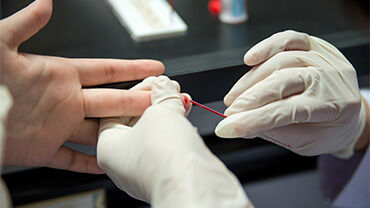Pre-exposure prophylaxis to prevent HIV among MSM in Europe
Evidence suggests that the use of pre-exposure prophylaxis (PrEP) for men who have sex with men (MSM) is an effective HIV prevention tool for Europe.
Pre-exposure prophylaxis (PrEP) is an antiretroviral therapy-based HIV prevention strategy to prevent or at least reduce the risk of HIV infection in adults who have not been infected with the virus but are at high risk of infection.
The results of two clinical studies assessing the effectiveness of PrEP among MSM in the EU/EEA were released at the annual Conference on Retroviruses and Opportunistic Infections (CROI 2015) in Seattle: the Pragmatic Open-Label Randomised Trial of Pre-exposure Prophylaxis (PROUD) conducted in the United Kingdom, and the double-blind placebo controlled trial Intervention Préventive de l'Exposition aux Risques avec et pour les hommes Gays (IPERGAY) conducted in France and Canada, accompanied by press releases by Public health England (PHE) and Recherche Nord & Sud Sida-HIV et Hépatites (ANRS). This came after early evidence of effectiveness lead to the interruption of the non-treatment arm in both studies in October 2014.
The PROUD and IPERGAY study participants were MSM at high risk of acquiring HIV. During the course of the study, a high incidence of HIV (8.9 and 6.6 per 100 person year, respectively) was observed among those men not assigned to the treatment arm. In both studies PrEP was incorporated into the existing risk reduction package, with either daily recommended administration (PROUD) or following an exposure/event-driven schedule (IPERGAY). Overall, PrEP was shown to have a high level of protection among the treated participants, reducing the risk of infection by 86% in both studies. There was no difference in the number of men diagnosed with other STIs between those taking PrEP and those not on PrEP, nor appreciable changes in condom use or sexual behaviour during the study period.
These results add to the growing body of evidence that PrEP should be considered as an additional prevention option for persons at high risk of HIV infection. Currently, PrEP is recommended as an additional prevention choice within a comprehensive HIV prevention package for MSM by the World Health Organization and for MSM and other high-risk groups by the Centers for Disease Control and Prevention.
ECDC comment on PrEP in Europe
The promising results of the PROUD and IPERGAY studies are of particular importance in the EU/EEA where the HIV epidemic is largely concentrated among MSM, and newly diagnosed infections in this group have increased by more than 30% during the past decade.
On the basis of the new evidence, EU Members States should give consideration to integrating PrEP into their existing HIV prevention package for those most at-risk of HIV infection, starting with MSM. Issues related to larger-scale PrEP implementation, such as cost-effectiveness, appropriate models of care and access points, provider training, routine monitoring of patients, including adherence to treatment and regular testing for HIV and other sexually transmitted infections, will need to be assessed and carefully addressed in the context of each Member State's health system. Monitoring and evaluation of PrEP implementation should be regarded as a component of any national/sub-national program.A key step towards roll-out of PrEP would be the review of the current regulatory approval of the medication (emtricitabine plus tenofovir disoproxil fumarate, Truvada®) to allow its use as prevention treatment in the EU/EEA, as strongly advocated by the European civil society organisations.
ECDC will continue to closely follow the research developments on this important additional prevention strategy and will be offering further scientific and technical support to the European Commission and the Member States to help ensure the success of their strategies for PrEP implementation.





